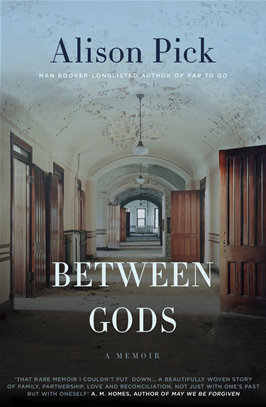Between Gods by Alison Pick

Reviewed by Brenda Brooks
Years ago I was fortunate enough to become good friends with a woman whose background was far different from my own, and I'm reminded of her while settling in with Alison Pick's memoir, Between Gods. My friend was born and raised in New York, and her family descended from a noted Jewish scholar and philosopher. I was fascinated by her ancient lineage as well as by Jewish history in general, though my day-to-day queries were often laughingly basic: Why, I wondered, did she consider herself Jewish when she didn’t attend synagogue, observe the religious holidays, and in fact helped me lug home and decorate a Christmas tree in December? Eventually, after much explaining, it seemed to come down to this: A Jew is any person whose mother was Jewish or any person who has gone through the formal process of conversion to Judaism.
Writer Alison Pick’s memoir, Between Gods, recounts a string of frustrating years in which she grapples and argues with this formal religious requirement. A Man Booker nominee in 2010, she records this phase of her life with passion and verve. Her ability to recall and evoke the depth and quality of her feelings at the time is substantial and thorough.
While researching her novel, Far To Go, Pick discovers that her grandparents escaped Czechoslovakia in 1939 by bribing a Nazi official. They “spent their lives in Canada posing as Christians — going to church instead of synagogue, eating plumb pudding at Christmas instead of matzah at Passover.” Pick’s father discovers his Jewish ancestry in his twenties, when it also becomes apparent that his grandparents died in a concentration camp. Pick becomes aware of her father’s true background at age twelve, and eventually becomes chagrined that, by forfeiting his true faith, he has deprived her of a Jewish home, although it is clear that he has actively chosen to emphasize being a businessman, husband and father, rather than focus on what he deems to be the past.
[Between Gods Recounts a string of frustrating years]
Frequently depressed since her twenties, Pick comes to believe that it is her denied ancestors, “the ones who died in the gas chambers” who are pulling her down into darkness. Her body, she believes, “is remembering the loss of my tribe.” She discusses such issues with a female rabbi who she hopes will some day sponsor her into the Jewish faith, although she is informed that her husband must convert as well. She attends a Doing Jewish course where she discovers that, since her mother is non-Jewish, there is “a process” she must pass through in order to complete her conversion. Her husband agrees to attend Jewish Information Course sessions with her every week for three hours, though he is uncertain about actually converting. Regardless, so steadfast is his support that as her preoccupation with the Jewish faith grows he offers to return a pair of boxer shorts purchased before he realized they were strewn with Xmas trees.
Pick becomes so haunted by her understanding of Judaism that even while attending her “Contact Improv” sessions she finds that the bodies surrounding her (“legs sticking out, arms at odd angles”) take on tragic historical associations. Later, when a Toronto hospital runs a study testing Ashkenazi Jewish women for a certain breast cancer gene, Pick enters the study at the suggestion of her husband. “Wouldn’t it be awesome if I had it?” she asks, and then adds: “Not the disease. Genetic proof that I’m a Jew,” and then wonders: “What have I been reduced to?”
Late in Between Gods, Pick recounts how she and her husband make plans to visit Auschwitz while in Europe to attend a literary festival. When they mention their intentions to their rabbi (who remains something of a stickler about religious requirements) they are surprised to know that the rabbi has never made the journey herself. “I don’t know what could make me go there,” she tells the couple. “I get it,” Pick says. “I know what she means. There’s an appeal in that refusal. Yet I have no choice but to face the darkness.”
It is perhaps not unusual for the memoir format to feel occasionally introspective to a fault since the topic is, after all, oneself. In the end, one must admire the author's willingness to speak with complete candor about deeply personal matters, and the heartfelt stamina she brings to her desire to reclaim a form of devout expression that she feels is profoundly her own, regardless of formal requirements.
Read more about Between Gods on the publisher's WEBSITE
Search this site: